January, 11 2024 | Silvana Jakupovic, ND
Hormonal Health and the Role of Fungi in Traditional Medicine
Hormones are the unsung heroes of our bodies, silently orchestrating a symphony that affects our mood, digestion, sleep, stress levels, weight, immune response, and so much more. Maintaining hormonal balance is crucial for our overall well-being. Hormonal imbalances can lead to various health issues, from mood swings to chronic conditions. But what if there were a way to achieve hormone optimization through natural remedies?
In this blog, we explore the fascinating world of functional mushrooms for women’s hormones, the relationship between testosterone and mushroom therapy, functional mushrooms and hormone-related mood disorders, among many other topics.
Our bodies are complex systems governed by a delicate balance of hormones. Hormones are crucial in regulating various aspects of our health, from mood and energy levels to reproduction and overall vitality. When this delicate balance is disrupted, it can lead to a range of health issues. This is where achieving hormone balance with mushrooms may play a role as the investigations for natural hormone regulation increase.
Whether you're dealing with hormonal imbalances, seeking to support your endocrine system, or simply looking to enhance your overall well-being, studies show mushroom supplements for hormonal balance may offer a natural solution as they have been used in traditional medicine for centuries.
Hormone Health and Mycology: Hormone Support with Fungi
Before delving into functional mushrooms, it's essential to grasp the significance of hormonal imbalances. These imbalances can manifest in various ways, affecting both males and females. Conditions like late-onset hypogonadism (LOH) and benign prostatic hyperplasia (BPH) are examples of hormone-related issues that males may face.
On the other hand, females grapple with conditions like polycystic ovarian syndrome (PCOS), endometriosis, and the challenges of menopause due to fluctuations in estrogen levels. These are just a few examples of how hormonal disruptions impact our lives. The good news is that nature provides powerful allies for hormone therapy alternatives with mushrooms.
Reishi Mushroom and Hormones
Mushrooms and Hormonal Health in Menopause
Reishi mushroom (Ganoderma lucidum) emerges as a potent ally in the quest for hormone balance. Research has shown that Reishi exhibits estrogen-like activity, making it a valuable asset for women experiencing menopause [1]. As women age and approach menopause, estrogen production declines, leading to a cascade of symptoms affecting various bodily systems.
This decrease in estrogen can lead to a range of symptoms, from mood swings to hot flashes. Reishi's estrogen-like properties may help alleviate these symptoms and promote a smoother transition through menopause. Reishi's ability to activate estrogen receptors, particularly estrogen receptor beta, offers a promising avenue for managing menopausal mood symptoms, such as depression and anxiety [2].
Polycystic Ovary Syndrome (PCOS) and Mushrooms
Moreover, Reishi's influence extends to addressing conditions like polycystic ovary syndrome (PCOS). This mushroom's ability to inhibit testosterone, mainly by reducing the activity of 5-alpha reductase, can alleviate the hormonal disruptions associated with PCOS [3]. By preventing the conversion of testosterone into dihydrotestosterone (DHT), Reishi may help mitigate the symptoms of this hormonal disorder.
Hormonal Acne and Mushrooms
High DHT levels are associated with various conditions, including benign prostatic hyperplasia (BPH) and acne [3]. Reishi may offer relief for those dealing with these hormonal imbalances by reducing DHT levels.
Furthermore, Reishi's hepatoprotective effects, which support liver health, are crucial for optimal hormone balance. The liver plays a significant role in metabolizing and regulating hormones, making proper functioning essential for hormonal equilibrium [4,5]. Optimal liver functioning is needed for optimal hormone balance, as the liver can remove, inactivate, or excrete excess levels in the bile [5]. Many conditions emerge due to improper metabolism of hormones by the liver, such as acne and other skin conditions, cortisol imbalances, insulin resistance, and even thyroid dysfunctions.
Cordyceps Mushrooms for Hormones: Hormonal Harmony through Mushrooms
Hormonal Health for Men with Mushrooms
Cordyceps, another remarkable medicinal mushroom, has garnered attention for its multifaceted benefits, including its impact on hormonal balance. For males, Cordyceps holds promise in improving sperm count and quality. Research involving male subjects demonstrated a 33% increase in sperm count, reduced sperm malformations by 29%, and a staggering 79% boost in sperm survival rates after eight weeks of Cordyceps supplementation [6]. Additionally, Cordyceps has shown the potential to enhance libido and sexual desire in both males and females, making it a valuable addition to intimate wellness routines [7,8].
Functional Mushrooms and Estrogen: Menopause Relief with Mushrooms
Cordyceps also offers benefits for female hormonal health. It can boost the production of 17-beta-estradiol (E2), a hormone crucial for egg maturation and uterine preparation for implantation [9]. By influencing the expression of critical enzymes involved in E2 production, Cordyceps showcases its potential to support fertility treatments like in vitro fertilization.
Furthermore, Cordyceps may serve as a hormone balancer or normalizer. It has been found to regulate hypothalamic-pituitary function, ensuring a hormonal balance that resembles that of non-menopausal individuals [10]. This can reduce menopausal symptoms and associated risks during the transition into menopause.
One significant concern during menopause is the increased risk of osteoporosis due to declining estrogen levels. Cordyceps comes to the rescue once again by preventing bone loss caused by estrogen deficiency. One study focused on preventing estrogen deficiency-induced osteoporosis using isoflavones isolated from the Cordyceps mushroom and found that Cordyceps could prevent bone loss due to estrogen deficiency [11]. The treatment group also exhibited increased levels of estradiol and lessened the increase in LH and FSH levels [11].
In addition to preserving bone health, another study on Cordyceps found that treatment with the mushroom extract prevented fat accumulation, liver hypertrophy, and lowered triglyceride levels, suggesting that Cordyceps has anti-obesity effects in menopause and may potentially lower risks of cardiovascular disease [12].
Lion's Mane: Hormonal Balance for Mental Health with Mushrooms
Menopause isn't just about physical changes; it also brings about psychological shifts. Depression and mood swings can be familiar companions during this transition. Lion's Mane mushroom (Hericium erinaceus), often called "the brain mushroom," offers solace during this emotional rollercoaster.
A study was published showing research indicating that Lion's Mane can activate Estrogen Receptor Beta (ERβ) in the brain, potentially reducing menopausal depressive symptoms [13]. ERβ has been recognized as a target in treating mood symptoms during menopause as a connection between the two has been established [14].
Chaga Mushroom and Hormonal Health
Oxidative stress, characterized by excess reactive oxygen species, becomes more prevalent during menopause. This oxidative imbalance can be linked to decreased estrogen levels, as estrogen plays a role in modulating antioxidant enzymes in the body [15]. While estrogen does not directly affect free radicals, it assists our biological antioxidant system in quenching these free radicals and lessening the possible development of oxidative stress [16].
Chaga mushroom (Inonotus obliquus) shines as an antioxidant powerhouse, boasting one of Earth's highest ORAC (Oxygen Radical Absorbance Capacity) values. By neutralizing free radicals and enhancing our antioxidant defences, Chaga may help reduce the risk factors associated with menopause, such as cardiovascular issues [17,18].
Oxidative stress can lead to hormone disruptions and contribute to various health issues, including cardiovascular disease. Incorporating Chaga into your routine can help safeguard your hormonal health and overall well-being.
Conclusion: Fungi and Hormonal Health
The world of functional mushrooms offers a natural and holistic approach to hormone regulation and overall well-being. Reishi, Cordyceps, Lion's Mane, and Chaga mushrooms each bring their unique set of benefits to the table. From easing menopausal symptoms to improving fertility and promoting emotional and physical health, these fungi have the potential to play a vital role in our hormone routines.
As we continue to explore the fascinating realm of mycology and its applications in healthcare, it's essential to remember that these natural hormone imbalances remedies are not a one-size-fits-all solution. Individual responses may vary, and consulting with a healthcare professional before integrating mushrooms into your hormone routine is advisable, especially if you have specific health concerns or conditions.
Incorporating functional mushrooms into your daily routine is easy, thanks to products like those offered by Eversio Wellness. Their mushroom blend formulations and 100% fruiting body extracts make it simple to enjoy the benefits of these remarkable fungi.
Embrace the power of adaptogenic mushrooms for hormones and embark on a journey to achieve optimal well-being naturally. Your body will thank you for it!






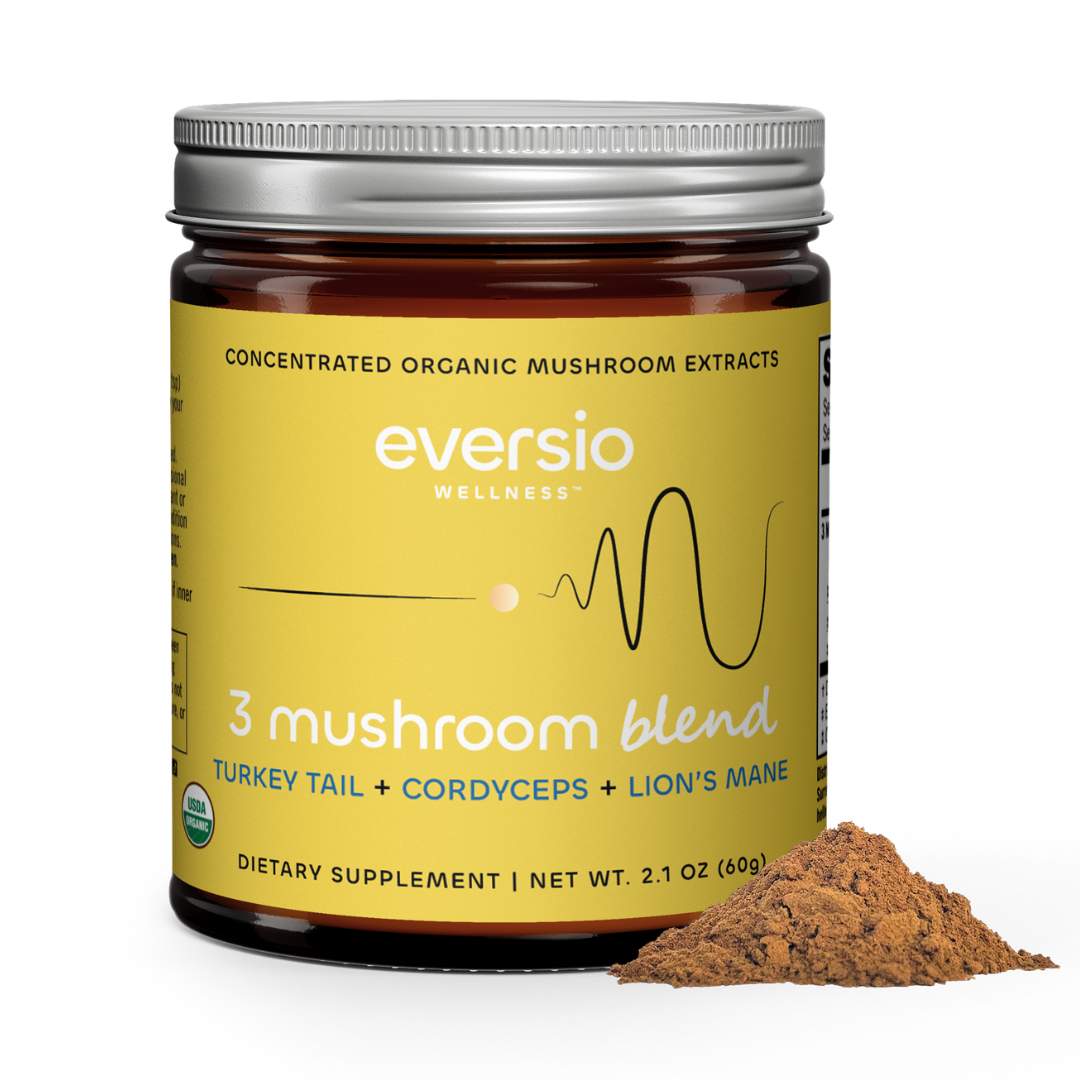
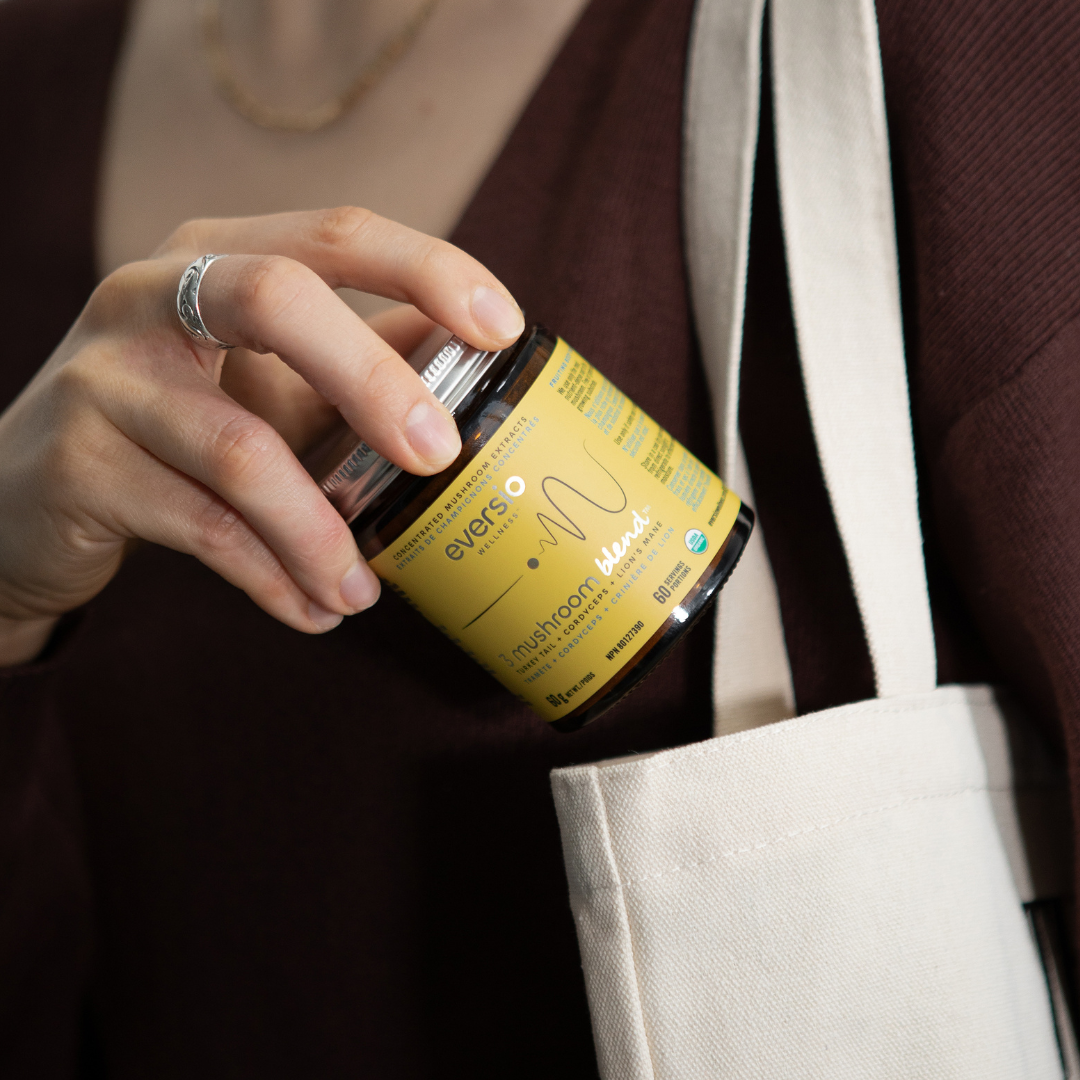


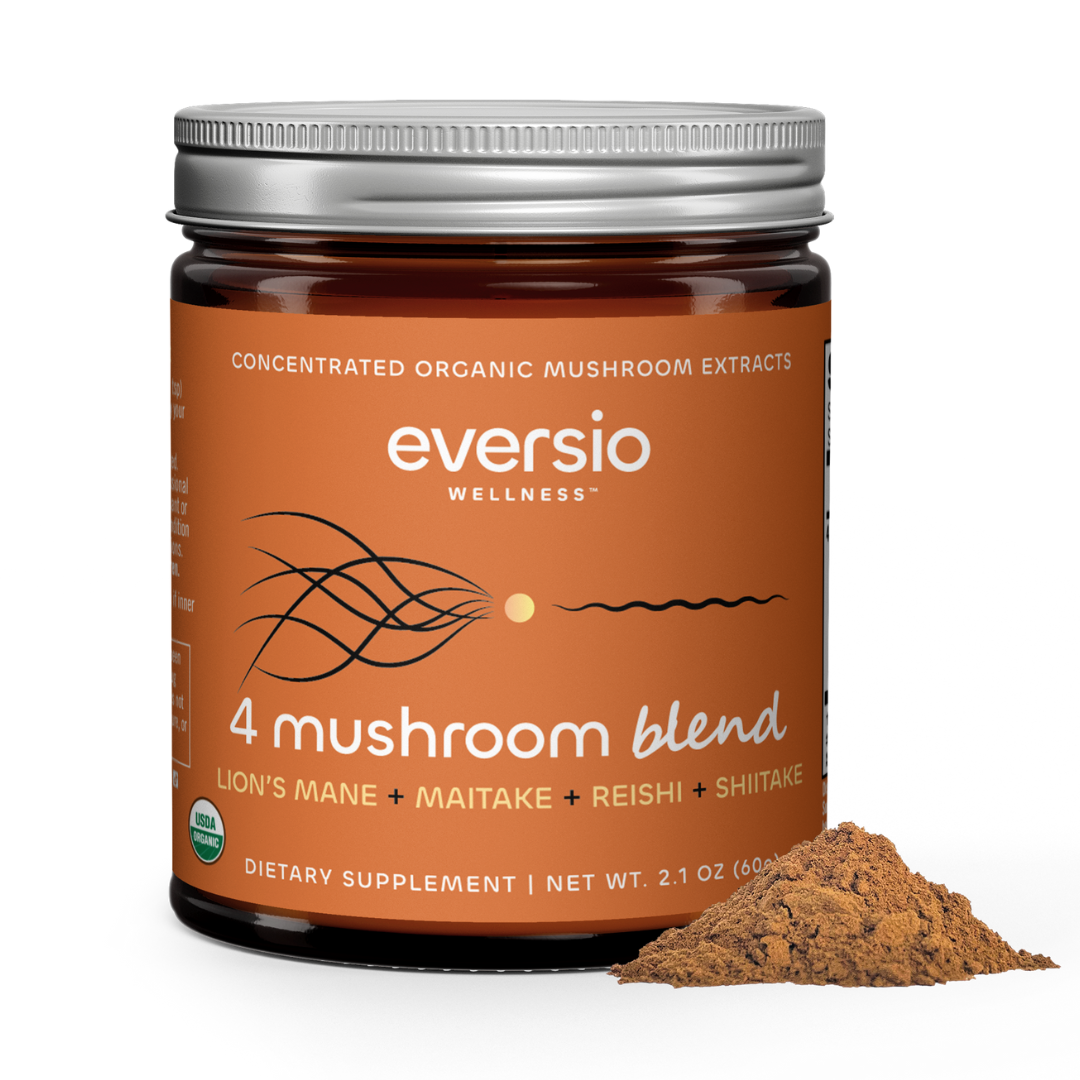


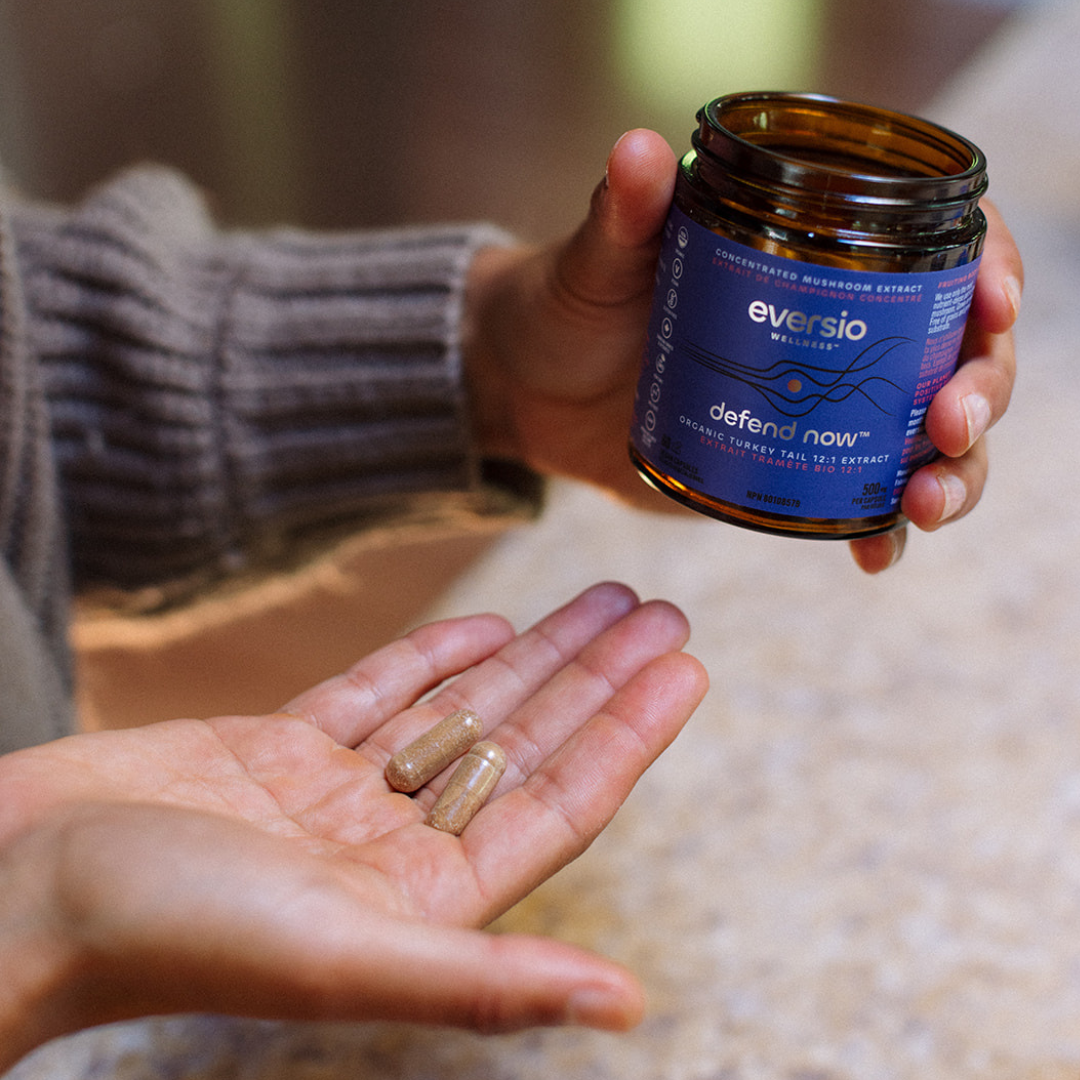
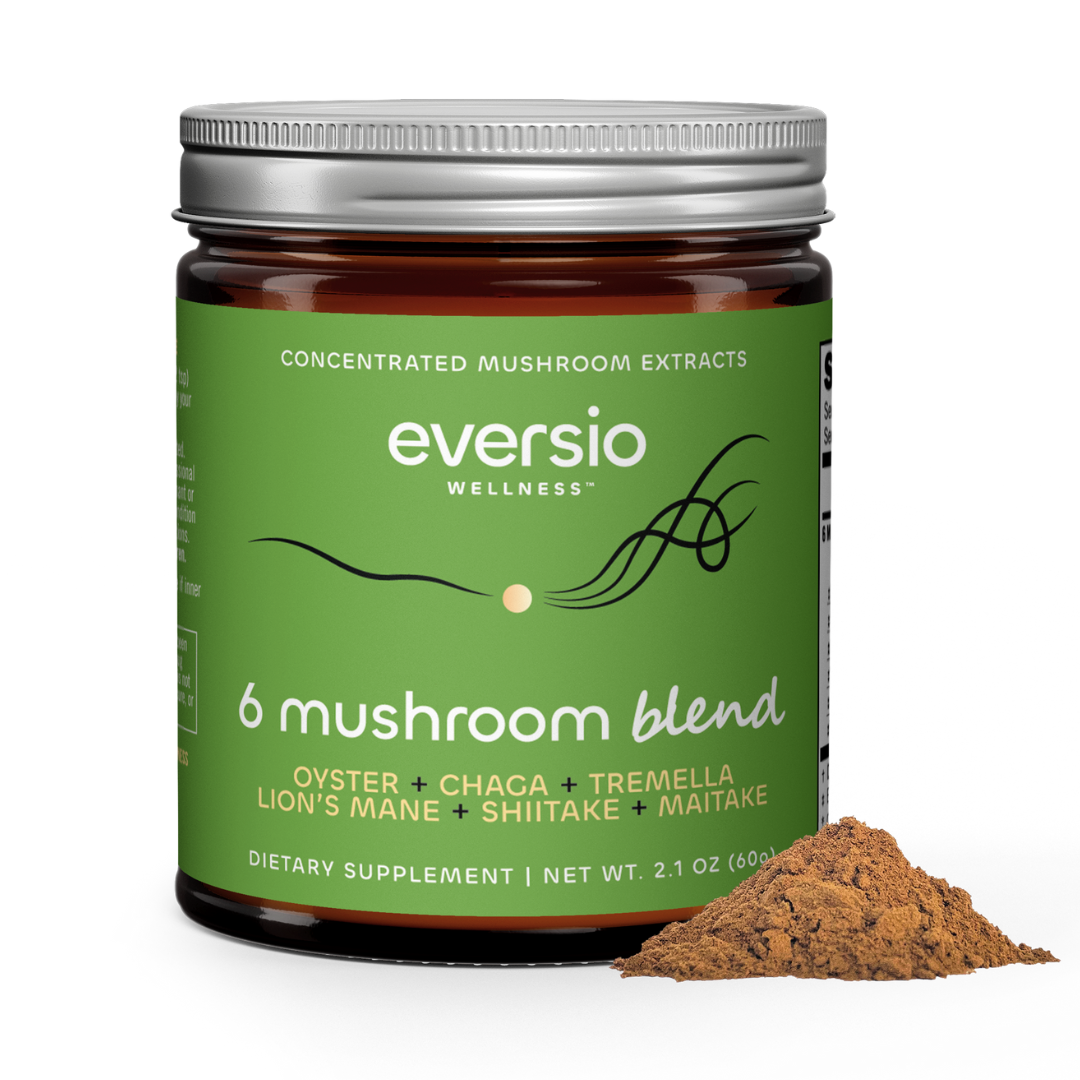
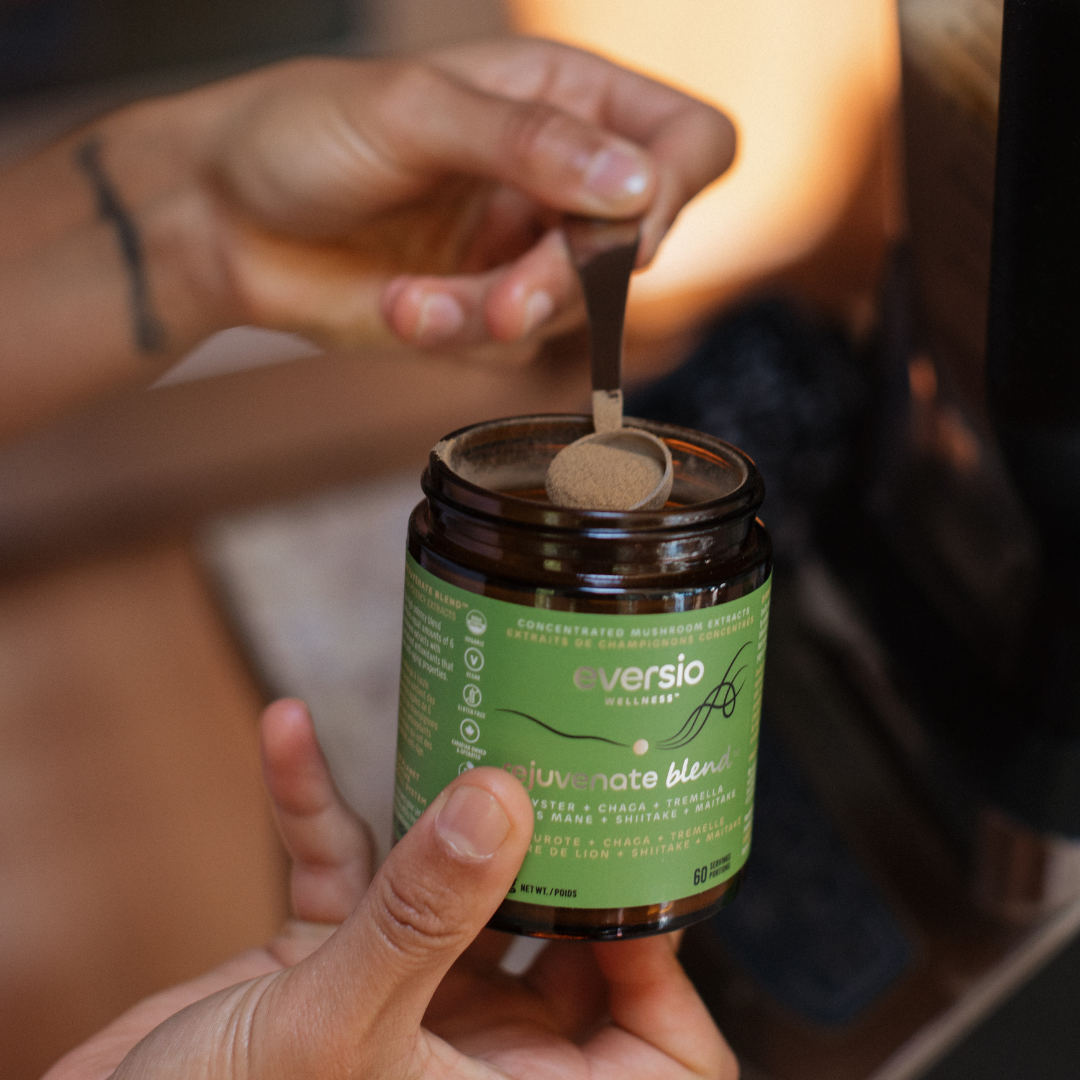








Leave a comment
All comments are moderated before being published.
This site is protected by hCaptcha and the hCaptcha Privacy Policy and Terms of Service apply.